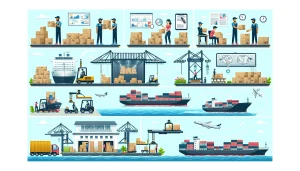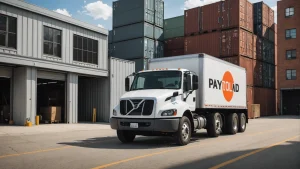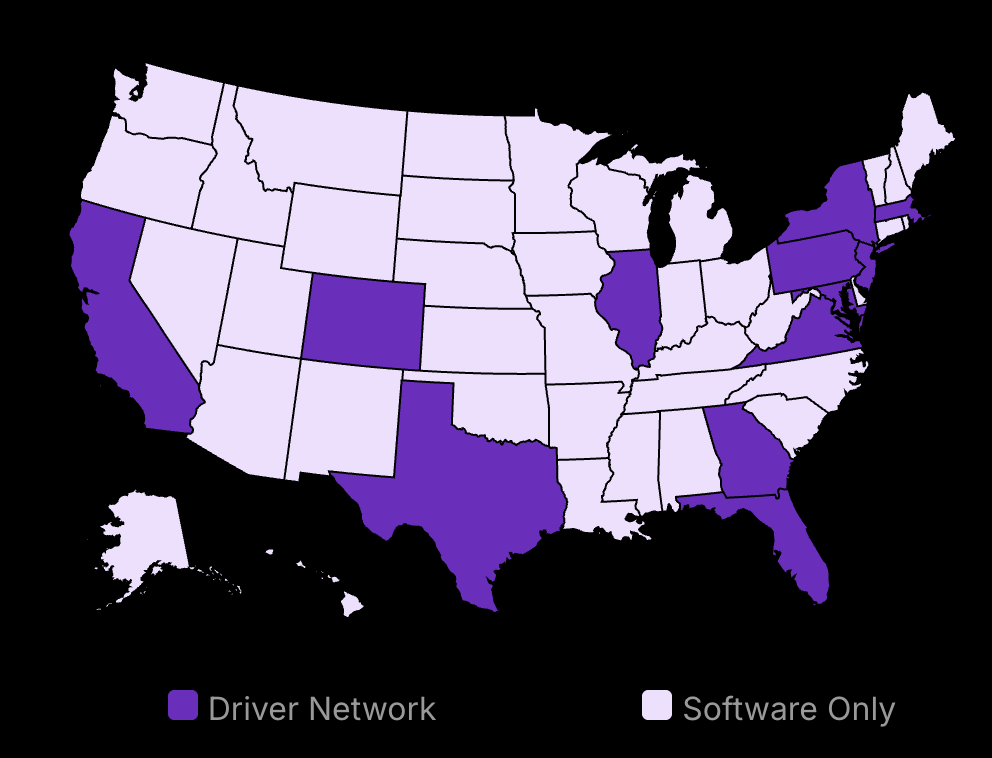No experience? No problem. You’re about to find out how you can steer your career in a new direction and become a truck driver – with zero experience.
Just imagine: 90% of truck drivers started where you are now, heading down the highway towards a robust, rewarding career – no fancy qualifications in the rear-view mirror. If you’re eager to carve out your own path in this industry, exploring 10 websites to locate courier positions can help you compare options and find the best courier job opportunities.
Hold onto your steering wheel.
Getting behind the rig with a clean slate isn’t a detour, it’s the most traveled road. This nugget of wisdom isn’t just a comforting pat on the back – it’s your roadmap to success in the trucking industry. Exploring how to excel in truck driving? Discover keys to landing the right delivery courier position that aligns with your expertise and passion.
Ready? Shift gears, your journey starts now. As you take this exciting leap, consider the local opportunities available in your area. If you’re particularly interested in urban logistics, you might want to learn more about becoming a part of the thriving community of Baltimore couriers who are making a significant impact in the field.

Earn $1,200+/week delivering for local businesses
Driver benefits:
- Steady local business routes
- Weekly pay + tips
- Dedicated support team
- Flexible scheduling
Essential Guide: How to Become a Truck Driver with No Experience
Step 1: Understand the Truck Driving Industry
Truck driving is more than just long-haul rides and constant commuting.
About the Market
The trucking industry is a crucial part of the U.S. economy, with trucks moving about 72.5% of America's freight by weight. In 2021, the trucking industry earned $875.5 billion in revenue, with approximately 3.5 million employed truck drivers and 1,102,799 for-hire trucking carriers. There are 2,094,700 trucking industry jobs in the U.S. as of 2021, with about 3.5 million truck drivers, making up 61.4% of those employed by the truck industry as a whole.
The large-scale logistics and supply chain management hinges heavily on competent tanker truck operators. Steel, construction materials, fuels, and food items are just a few seconds of the goods transported using big rigs.
We’re not just talking about the domestic market, it’s a global industry. International road freight alone rounds off to billions of tons – a staggering number that paints the industry’s immensity.
So it’s beneficial to understand how your role fits into the bigger picture. Knowing the industry’s intricacies, you can align your skills and career objectives more effectively.
Step 2: Acquire Your Commercial Driver’s License (CDL)
The Commercial Driver’s License (CDL) is your passport into the professional truck driving world. It’s a two-stepper, the written exam, and the skills test. Passing the test grants you the ticket to drive commercial vehicles – tractor-trailers and cargo trucks to name a few as new drivers.
Before taking the exams, you must get through CDL training. It’s where you get the hang of the vehicle’s controls, safety measures, and road regulations. Think driving school but for big rigs. These CDL training programs often end with a pre-CDL exam to gear you up for the real thing.
Step 3: Apply for Entry-Level Truck Driving Jobs
Once you have the CDL, you can start applying for truck driving companies that hire inexperienced drivers. Even with no experience, many companies are willing to train novices. They’re not expecting Mario Andretti; they just want dedication to safety and efficient driving. As you embark on your trucking journey, you might also consider exploring opportunities beyond traditional long-haul driving. For instance, using an Austin same-day courier service allows you to gain practical experience and diversify your skill set.
To increase your chances, make sure your application stands out. In your resume, highlight any related experiences – like short-haul trips freight handling, or any logistics internships. Exploring strategies to land an ideal delivery courier position? Discover how to tailor your application to match your skills and interests in the courier industry.
Also, leverage the networking opportunities in CDL training or generally within the used vehicle and service industry. You’d be surprised at who’s hiring.
Truck Drivers
1 in 9 truck drivers are independent, a majority are lease-purchase operators. There is an ongoing driver shortage in the U.S., reaching a high of 60,800 in 2018. Approximately 90% of all trucking companies operate six or fewer trucks.
Essential Skills and Qualities of Successful Truck Drivers
Physical and Mental Stamina
Driving long distances requires a unique blend of physical and mental toughness. Truckers often spend hours on the road, fighting boredom, traffic, and sometimes tricky weather conditions. Beyond just the physical tedium, making safe and swift judgments becomes second nature to successful drivers.
Developing this stamina isn’t an overnight achievement but a combination of regular physical exercise, quality rest, and mental wellness activities. A good routine might include daily workouts involving cardio and strength training, ensuring at least 7-8 hours of sleep for adequate rest, and mental health exercises like meditation or mindfulness to keep your mind sharp.
Tips on Building and Maintaining Stamina
Quality diet also plays a key role in maintaining energy levels throughout long drives. Consuming balanced meals rich in protein, vitamins, and complex carbs can help retain body vigor. Try to avoid caffeine or other stimulants as they might lead to sudden energy crashes.
Healthy routines are your best ally on the road. Stick to your workout, sleep, and meal schedules as consistently as possible, even when you’re on the go. A disciplined routine can do wonders to keep you physically fit and mentally alert.
Navigation and Map Reading Skills
In the lives of experienced or inexperienced truck drivers, getting from point A to point B isn’t as simple as following a GPS. Unexpected detours, low bridges, or restricted roads may necessitate swift strategy changes. That’s why exceptional navigation and map reading skills are invaluable.
Even in today’s digital age, a physical map can prove helpful when technology fails. Therefore, understanding how to plot your course effectively – being able to correctly read and comprehend map symbols, legends, and scale – is crucial.
Suggestions for Improving These Skills
Brush up your map-reading skills with online courses or resources. Remember, practice makes perfect, so try planning out hypothetical routes or deciphering unfamiliar areas using just a map. You can also use navigation apps regularly and compare their suggested paths to your manual route plans – a great way to test your skills.
Mechanical Knowledge
A working understanding of truck mechanics can make a world of difference on the road. This know-how helps you identify potential issues before they escalate and become costly repairs or dangerous malfunctions.
Assets such as understanding engine components, knowing how to change a truck tire, or recognizing the signs of brake wear can be incredibly useful for inexperienced drivers.
Resources for These Skills
Continuous learning is at the core of succeeding as a truck driver. Dive into the world of auto mechanics with online courses, handy YouTube tutorials, or even attending local workshops if possible. Having a mentor in the field can be immensely helpful too. Soak up wisdom from experienced drivers whenever you can. Be proactive in maintaining your truck’s health and your own safety on the road.
The Trucking Industry
There are 13.5 million trucks registered in the U.S., including 2.97 million semi-trucks and 10.5 million single-unit trucks. In 2022, 74% of U.S. truck drivers were concerned about the pressure to work longer hours due to the driver shortage, and 68% found it difficult to keep up with insurance-related matters and changing industry regulations.
The trucking industry is facing challenges such as high insurance costs, driver shortage, truck parking availability, and changing industry regulations. Fuel costs were the second-highest trucking-related expense in 2022, representing 28% of all costs, and insurance premiums for trucking companies have seen a huge spike in the last few years.
Overcoming Challenges as a New Truck Driver
Dealing with Loneliness and Isolation
Truck driving, especially for long-haul trips, involves significant solitary periods. The profession demands spending extensive hours alone on the road, away from family and friends. This solitary lifestyle can sometimes lead to feelings of loneliness and isolation. To explore reliable delivery options while addressing your logistical needs, check out a well-reviewed courier service in Sacramento that caters to your requirements.
Navigating Solitude on the Road
In trucking companies, the solitude comes with the territory. However, it’s crucial to differentiate between appreciating solitude and feeling lonely. Solitude can be a time for self-reflection, to catch up on podcasts or audiobooks, or simply to enjoy the tranquility.
There are various ways drivers can manage loneliness on the road such as maintaining regular contact with family and friends, making stops for social and human interaction, or using technology to stay connected.
Managing Fatigue and Stress
The demanding schedule and long hours on the road pose a challenge in terms of stress and fatigue management. Truck drivers must practice effective self-care measures to prevent burnout and maintain safe driving habits.
Importance of Rest and Stress Management
Proper rest is not a luxury in the trucking industry; it’s a necessity. A well-rested truck driver is a proficient driver. High-quality sleep can drastically reduce the risk of accidents and improve overall driving performance.
Sleepıng on The Road
the NHTSA has published a National Compendium of Efforts to Eliminate Drowsy Driving, which provides an overview of the efforts to address drowsy driving and its impact on traffic safety. The report highlights the importance of sleep in driving safety and the need for a coordinated effort between the traffic safety and sleep science communities to address the issue.
Strategies for Managing Fatigue and Stress Effectively
Effective stress management involves incorporating regular breaks, eating healthy meals, staying physically active, and engaging in relaxation techniques such as deep breathing or mindfulness exercises.
Building Experience and Reputation In Companies That Hire Truck Drivers
The importance of gaining experience and building a good reputation stands true in the trucking industry. These factors not only provide job stability but also open avenues for higher-paid assignments or preferred schedules.
Importance of Experience and Reputation
Gaining experience involves learning the ropes, sharpening driving skills in addition to a clean driving record, and understanding industry standards. Simultaneously, developing a good reputation ensures reliability and trustworthiness in the eyes of employers and clients.
Tips for Achieving Success
Perseverance, open communication, and consistent performance can expedite the process to gain experience and reputation. Persistently working on improving skills, communicating effectively with team members and clients, and maintaining a steady high-quality performance can help in building a substantial career in trucking.
The Benefits of Becoming a Truck Driver
Job Stability and Demand
The logistics industry has been facing a grave shortage of truck drivers for years. This is a twofold boon for individuals considering this career path. With the massive demand for truck drivers, there’s an implicit guarantee of job stability, providing a cushion against uncertainties. Interested in steering your career towards the logistics sector? Discover how to pursue a career as a truck dispatcher, encompassing the essential skills and qualifications needed.
Moreover, with the ever-growing ecommerce industry, the demand for truck drivers is projected to soar in the coming years. This makes truck driving a reliable sector devoid of seasonal fluctuations and sudden job cuts common in other industries.
Growing Industry
The U.S. trucks moved 10.93 billion tons of freight in 2021, and there are 4.06 million semi-trucks operating in the U.S. as of 2021. The trucking industry is expected to grow at a 3.0% CAGR through 2027, and truck driver jobs are expected to grow 6% through 2030.
Competitive Pay and Benefits
Compared to other sectors, truck driving offers impressive earning potential. Apart from the basic salary, truck drivers often enjoy additional benefits like overtime pay, allowances, and bonuses. Some companies provide health insurance, retirement plans, and paid vacations making the overall remuneration package attractive.
The pay structure in trucking can vary tremendously, depending on various factors like the type of haul, distance traveled, and experience. In general, long-haul truck drivers tend to make more than their counterparts who drive locally. Curious about the key factors to keep in mind when seeking positions as a truck driver? This article explores crucial considerations for those interested in truck driver roles.
Average Pays
91% of truck drivers work full-time, and 34% of freight trucking costs go toward paying drivers' wage. The average salary of a truck driver in the United States is currently USD 28.69 per hour or USD 59,684 annually. The top 10% of truck drivers make more than $66,800 per year.
Freedom and Flexibility
One of the distinctive perks of being a truck driver is the autonomy and flexibility it provides. No cubicles, no micro-managing bosses, and no stringent 9-to-5 schedules.
Many truck drivers relish the fact that they get to see different parts of the country, enjoy different landscapes, and meet diverse groups of people. It’s a job and an adventure rolled into one.
Driving on long open roads, listening to your favorite playlist, and encountering new experiences at each turn – such stories from truck drivers attest to the freedom and flexibility this profession can offer.
The Road Ahead: Leveraging Your Potential in Trucking
The pathway to trucking isn’t paved solely with prior experience. Aptitude, dedication, the willingness to learn, and resolute guidance have driven millions to successful careers without rearview mirrors full of past trucking experience.
This is a testament to industry accessibility, capacity for growth, and the remarkable community that continuously shapes new professionals. As today’s read unveils, trucking offers a universe of opportunity waiting for your exploration.
Don’t let the lack of initial experience steer you away from this rewarding career path. Begin by earning your commercial driver’s license, finding a truck driving job, and gaining real-world experience facilitated by dedicated mentorship programs. It’s your turn to shift gears and start your journey. Are you ready to change your life and hop in the driver’s seat?
Take some time today to explore the support and programs available, and take that first step towards a career that promises new horizons. Embrace the thrill of the road, the freedom of the ride, and the satisfaction of a job well done. The road ahead is clear, and it’s your turn to drive.





























